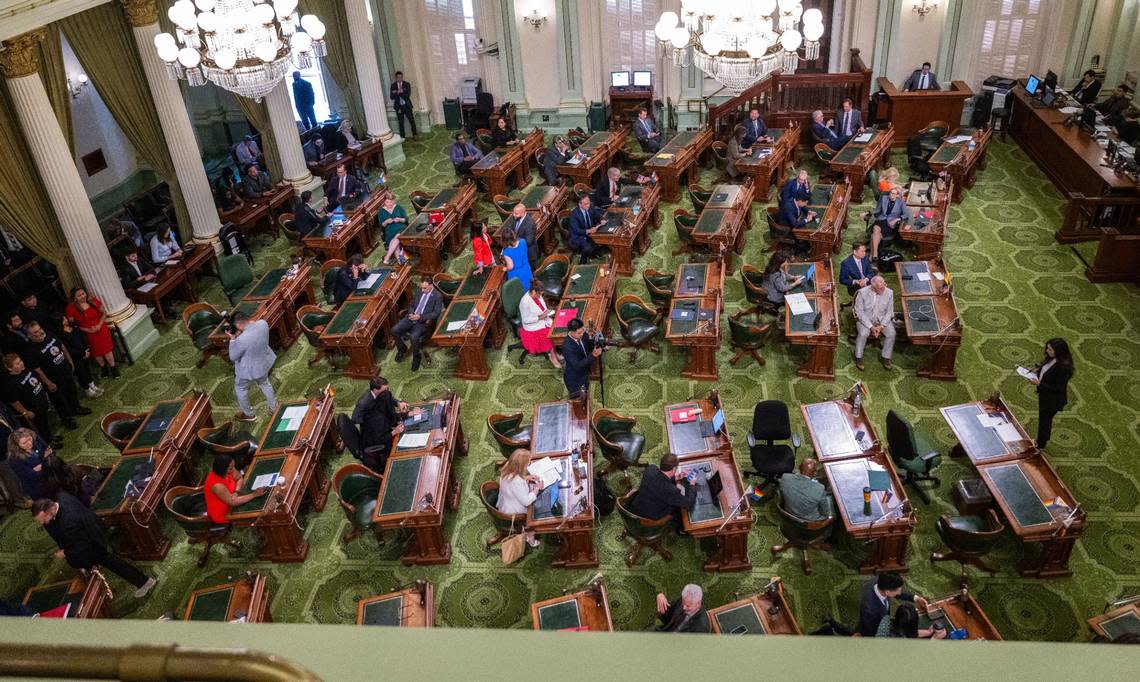California Democrats approve budget with spending wins. Why they still want billions from voters

California’s Legislature on Wednesday night approved most of the bills that make up the $298 billion budget agreement with Gov. Gavin Newsom to close a roughly $47 billion deficit.
The final budget — which Newsom and Democratic legislative leaders announced on Saturday — contains many of Democrats’ spending priorities, including money for homelessness grants, social safety net services, public health initiatives and affordable housing programs.
The governor on Wednesday signed the placeholder budget the Legislature passed on June 13 to meet the June 15 deadline they needed to hit to receive their paychecks.
The bills lawmakers passed Wednesday added specific elements of their agreement with Newsom that weren’t in that spending plan.
He will likely sign the budget bills lawmakers approved on Wednesday after he returns from Atlanta, where he’s headed to support President Joe Biden in the debate against former President Donald Trump.
The spending agreement between legislative leaders and Newsom provides funding for a sixth round of local homelessness grants, in-home supportive services for undocumented immigrants and pay increases for health care providers who serve patients enrolled in Medi-Cal, the state’s version of the federal Medicaid program.
To offset the spending, lawmakers and the governor plan to cut California Department of Corrections and Rehabilitation spending by $750 million. They will also dip into reserves, cut state operations by nearly 8% and delay a health care worker minimum wage that was to start this summer.
The budget battle is not over, though. Legislators are still working out two bond measures that will ask voters in November to allow California to borrow even more money for school facilities and climate change-related programs.
Senate President Pro Tem Mike McGuire, D-Healdsburg, on Monday confirmed lawmakers will seek to extend the deadline for adding measures to the November ballot from June 27 to July 3.
“We’ve been working like hell on the issue of bonds,” McGuire said in a statement. “We’re in the home stretch.”
Bond negotiations continue
Bonds have played into the budget process in a significant way.
Lawmakers have sliced budget dollars for climate change and school facilities, an indication they’re hoping to use bond money to fill those holes.
The spending plan agreement includes hundreds of millions of dollars in cuts to water storage projects, climate resilience initiatives and dam safety as well as a handful of other related reductions. The Assembly floor report of the budget said explicitly the Legislature and Newsom cut $875 million in general fund money for the school facilities program “in anticipation of a November 2024 School Bond initiative.”
Negotiations likely involve efforts to combine at least two school facilities bonds and a handful of climate bonds.
McGuire cited those two priorities when asked about bond negotiations, saying ensuring students have proper classrooms and campuses is close to his heart. On the climate side, he cited wildfire prevention and drinking water as two important potential bond elements.
Assemblyman Al Muratsuchi, D-Torrance, authored a $14 billion bond funding construction and modernization projects at kindergarten through community college facilities. Another bill from Sen. Steve Glazer, D-Orinda, seeks $15 billion for the same sorts of improvements, but his legislation includes University of California and California State University campuses.
Muratsuchi and Glazer declined to comment on their bonds, citing ongoing negotiations.
Sen. Ben Allen, D-Santa Monica, and Assemblyman Eduardo Garcia, D-Coachella, have climate bonds, both of which seek more than $15 billion for water quality and conservation, wildfire prevention, coastal preservation, clean energy projects and more.
“We’re working on it, and we’re getting real close,” Allen said of negotiations.
Housing is one priority that likely won’t get a bond measure, although the governor and lawmakers opted to include budget funding for homelessness grants, loans to help developers build affordable rental housing and a program to assist local government housing planning.
Assemblywoman Buffy Wicks, D-Oakland, has been pushing for a $10 billion housing bond, although she said earlier in the month she would remain undeterred if her bond didn’t advance, especially in light of the budget dollars.
“This would give us the ability to fund the housing as much as we can in the current environment we’re in and go back at the ballot in two years, if we need to,” she said of the budget money


